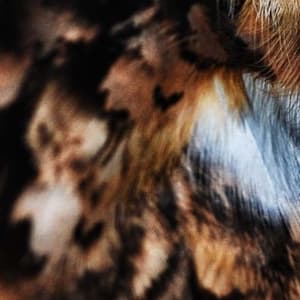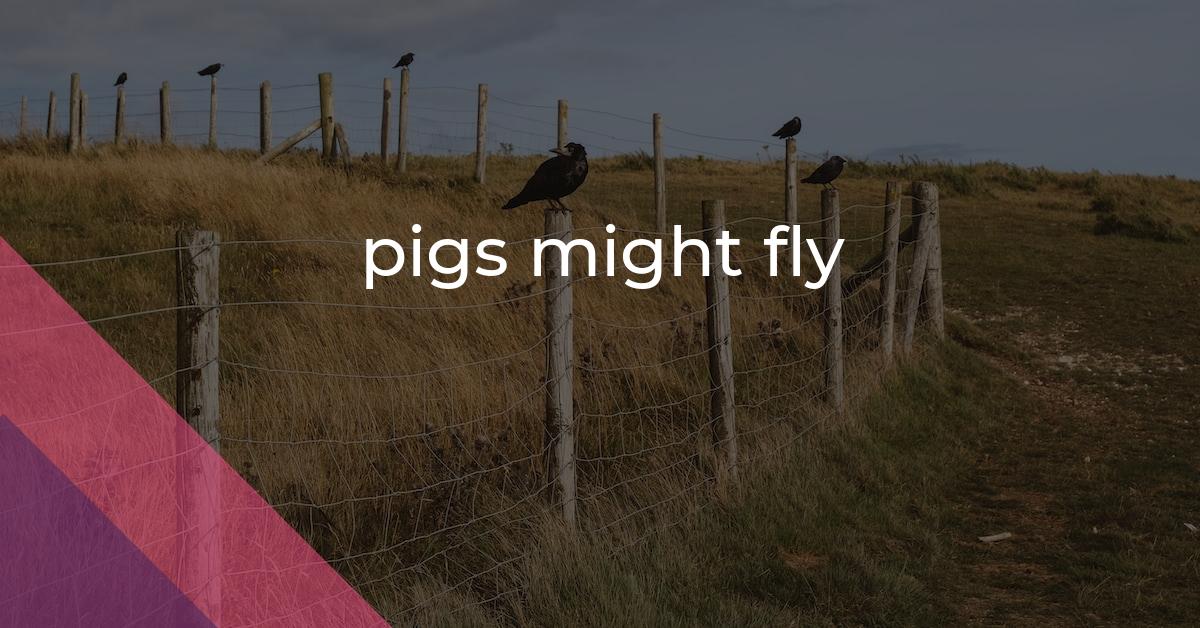pigs might fly: Idiom Meaning and Origin
What does ‘pigs might fly’ mean?
The idiom "pigs might fly" means that something is extremely unlikely or impossible to happen.

Idiom Explorer
An idiom used to describe someone or something that is highly unusual or unique; as rare as a rare animal.
The idiom "rain cats and dogs" means heavy or torrential rain.
"Put lipstick on a pig" is an idiom that means attempting to make something or someone appear more attractive or appealing, despite its inherent flaws or shortcomings.
The idiom *pigs can fly* means that something is completely impossible. It is often used to express disbelief or to emphasize the unlikelihood of a situation or event.
"Pig in a poke" is an idiom that means buying something without inspecting it, resulting in possible disappointment or deception.
The idiom "pie-in-the-sky" refers to something that is unrealistic or unlikely to happen. It describes a situation or idea that may seem appealing or enticing, but is not practical or achievable in reality.
The idiom "pie in the sky" means something that is unrealistic or unlikely to happen. It refers to a promise or idea that sounds good but is not practical or achievable.
The idiom "pearls before swine" means to offer something valuable or precious to someone who can't appreciate or understand its worth.
The idiom "outside chance" means a very small probability or possibility of something happening.
Surprising Origins: Pigs in Flight
Pigs might fly is an idiom that expresses doubt or disbelief about the likelihood of something happening. The phrase has been in use since at least the early 17th century and is believed to have originated in England, later spreading to other English-speaking countries.
The primary meaning of this idiom is that something is highly improbable or impossible. The idea of pigs flying is used to convey the absurdity of the situation. When someone makes an outlandish or unrealistic statement or prediction, "pigs might fly" can be used to dismiss the possibility of it being true.
One theory regarding the origin of this phrase suggests that it may have been influenced by the medieval belief that pigs were unable to swim. Therefore, the idea of them flying was seen as an impossibility. Another theory proposes that the phrase may have been derived from a Spanish expression "cuando las ranas críen pelo" which means "when frogs grow hair." This Spanish expression could have influenced the creation of the English idiom.
In modern usage, "pigs might fly" is commonly used in spoken and written English. It is often used in a lighthearted or humorous manner to express doubt or disbelief. However, it can also be used in a more serious context when expressing cynicism or skepticism towards a particular claim or idea.
This idiom has become ingrained in the English language and is widely recognized and understood by native speakers. It has also been adapted and referenced in various forms of popular culture, including literature, films, and television shows.
In addition to the idiom "pigs might fly," there are other related idioms that convey similar meanings. One such idiom is "pigs can fly." This idiom is often used to express extreme skepticism or disbelief. It emphasizes the unlikelihood of a particular event or situation.
There is also the idiom "not likely." This idiom is used to express doubt or skepticism about the possibility of something happening. It conveys a sense of skepticism or disbelief similar to "pigs might fly."
Another related idiom is "pie in the sky." This idiom is used to describe something that is unrealistic or unlikely to happen. It suggests that the promised outcome or reward is so unlikely that it is comparable to having pie in the sky.
The idiom "pigs might fly" is an expression of doubt or disbelief about the likelihood of something happening. It has a long history in the English language and is widely recognized and understood. Alongside other related idioms like "pigs can fly," "not likely," and "pie in the sky," it conveys a sense of skepticism or disbelief towards unlikely or improbable events. These idioms serve as reminders to question the improbable while also acknowledging the potential for wonder.
Example usage
Pigs might fly, meaning that something is extremely unlikely or impossible, can be used in various ways:
1. "Sure, I'll believe that when pigs fly." - This sentence expresses strong doubt or disbelief towards a particular claim or statement.
2. "I'll finish this project by tomorrow, when pigs fly!" - Here, the phrase is used to emphasize the unlikelihood or impossibility of completing the task within the given timeframe.
3. "If she apologizes to me, pigs might fly." - In this example, the idiom is used to highlight the improbability of a certain outcome, suggesting that it is highly unlikely for the person mentioned to offer an apology.
More "Impossibility" idioms



